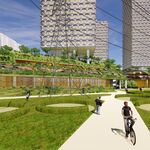B
billonlogan
Guest
By ROB GRANATSTEIN, CITY HALL BUREAU
Toronto Sun
In a year when Torontonians face a property tax increase, and will see water rates hiked 9%, there is a little bit of good news: On-street parking rates will not be going up.
"Our rates are pretty well where they should be," said Toronto Parking Authority president Maurice Anderson.
On-street parking was raised to $3 an hour in the downtown core two years ago and Anderson said that's where it will stay.
Anderson said there's often pressure from people who want to see more revenue come to the city from the TPA to make downtown parking as expensive as it is in cities like Vancouver, where it's $4.50 an hour. "We're generating as much money as anyone," he said. "Do I really care what anyone else is charging?"
The Green P lots, also under the control of the TPA, could see small increases but nothing significant, he said.
Don't expect any savings when the new government cuts the GST from 7% to 6%.
"It's very expensive to change all these machines to give an extra 3 cents of parking,"Anderson said.
That means more money for Toronto's coffers. The TPA takes in $92.5 million in parking revenue, so a full year of the reduced GST would mean an extra $925,000 for the city that would have previously gone to the feds.
--------------------------------------------
I like the last paragraph, the city will reap the rewards of the reduced GST. Already the new Harper government is paying dividends to the City of Toronto.
Toronto Sun
In a year when Torontonians face a property tax increase, and will see water rates hiked 9%, there is a little bit of good news: On-street parking rates will not be going up.
"Our rates are pretty well where they should be," said Toronto Parking Authority president Maurice Anderson.
On-street parking was raised to $3 an hour in the downtown core two years ago and Anderson said that's where it will stay.
Anderson said there's often pressure from people who want to see more revenue come to the city from the TPA to make downtown parking as expensive as it is in cities like Vancouver, where it's $4.50 an hour. "We're generating as much money as anyone," he said. "Do I really care what anyone else is charging?"
The Green P lots, also under the control of the TPA, could see small increases but nothing significant, he said.
Don't expect any savings when the new government cuts the GST from 7% to 6%.
"It's very expensive to change all these machines to give an extra 3 cents of parking,"Anderson said.
That means more money for Toronto's coffers. The TPA takes in $92.5 million in parking revenue, so a full year of the reduced GST would mean an extra $925,000 for the city that would have previously gone to the feds.
--------------------------------------------
I like the last paragraph, the city will reap the rewards of the reduced GST. Already the new Harper government is paying dividends to the City of Toronto.




